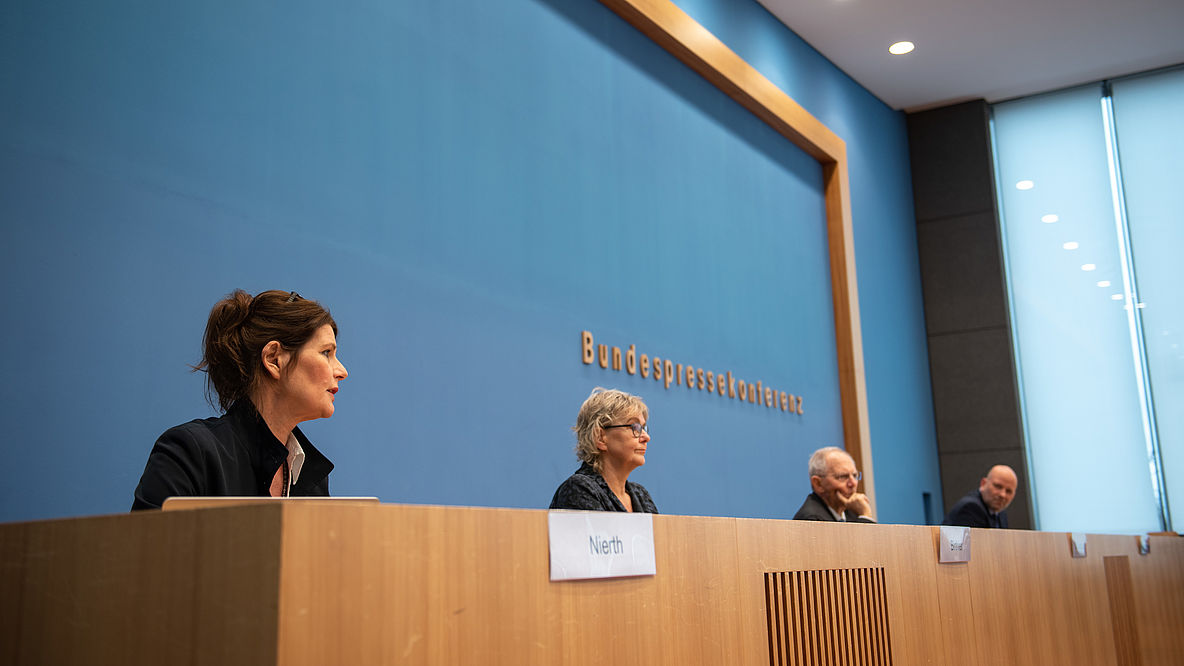Kick-off Citizens' Assembly on "Germany's Role in the World"

Tonight (13 January) marks the start of the second nationwide Citizens' Assembly with people drawn by lot from all over Germany: During ten online events between now and 20 February, the 160 (169 with buffer) citizens drawn by lot will draw up recommendations on how the Federal Republic should act on the global political stage in the future.
President of the Bundestag Dr. Wolfgang Schäuble has assumed patronage for the nationwide citizen participation project. "Citizens' Assemblies are a potential instrument to achieve more participation and dialogue in representative democracy," he says, "They are not a competitor to the tried and tested parliamentary decision-making procedures, but a useful addition that can also help deepen understanding of the complexity of political issues and democratic decision-making processes."
Marianne Birthler, who will act as chairwoman of the Citizens' Assembly, explains, "Democracy and freedom thrive on having as many committed, critical and well-informed citizens as possible. People who ensure a lively and constant public discourse on the basis of our constitutional values and on an equal footing with politicians are the best guarantors of an open society. To achieve such a discourse and mutual interest, we don’t just need serious media, but also spaces and opportunities that enable a trusting exchange. Ideally, this connects not only the population and politics, but also people of different generations, origins, professions or lifestyles who otherwise rarely come into conversation with each other."
"A randomly selected citizens' assembly brings the whole country to the table. This citizens' assembly is about recommendations on Germany's role in foreign policy, but also about testing a new element of political participation. Along the way, we are gaining knowledge about citizens' assemblies in the online format," adds Claudine Nierth, board spokeswoman for the association Mehr Demokratie, which is organizing the project in cooperation with the Es geht LOS initiative as a self-responsible and self-financed model project. "Randomly drawn citizens' assemblies can overcome the distance between the citizens and parliament and provide members of the Bundestag with an important tool in decision-making. They strengthen trust in democracy and can enrich politics."
Starting today, the participants drawn by lot will spend six Wednesday evenings and four Saturdays deliberating on detailed issues in the five thematic areas of sustainable development, economy and action, EU foreign policy, peace and security, democracy and the rule of law. Each person drawn at random will be assigned to a topic area and will discuss it in ever-changing small groups. Experts will provide information on various perspectives on the individual topics in online presentations and will be available to answer questions. All consultations are professionally moderated and documented. The participants, who are drawn by lot, also meet again and again in large groups and vote at the end on the recommendations for action on foreign policy, which will be publicly presented to the Bundestag on March 19 in the form of a citizens' report.
The composition of the Citizens' Assembly corresponds fairly closely to the population in Germany in terms of the distribution of age groups, genders, educational qualifications, location and size of places of residence, and migration background. First, communities were drawn by lot, then randomly selected people were contacted from their population registers, and the participants in the Citizens' Assembly were then selected from those who responsed. People with lower levels of education were especially targeted in order to bring their share of the Citizens' Assembly closer to the share in the population as a whole. The process is carried out by the participation institutes ifok, IPG and nexus and funded with support from the Robert Bosch Foundation, Stiftung Mercator, Schöpflin Foundation, Zeit Foundation and Open Society Foundations.
Schedule, list of consulted experts and background information.
Note to editorial teams: The official plenary parts of the Citizens' Assembly (with all participants) will be livestreamed on the YouTube channel of Mehr Demokratie. The official parts of the individual thematic groups will be recorded and will also be available, with a slight delay, on Mehr Demokratie's youtube channel.
For questions: Caroline Vernaillen, Global Manager PR Democracy International, +49 221 669 665 30, vernaillen(at)democracy-international(dot)org